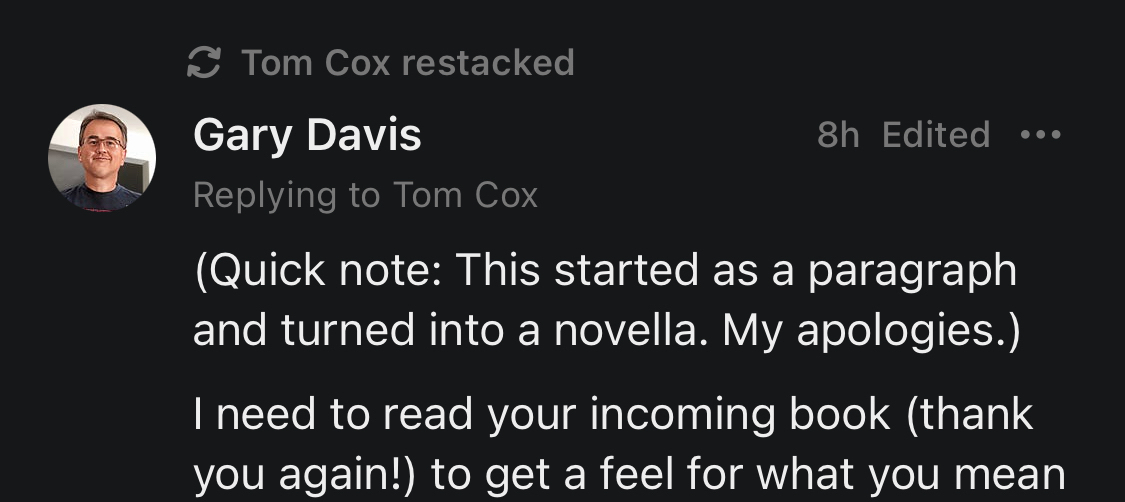@bbowman Interesting. I’m assuming there’s a lot of truth to this. But could it also be that an overwhelming-many of those in the church now experience and maintain their own “undeconstructed” faith through this “machine- and algorithm-led” way?
Nearly my entire family, for instance, still attends an Evangelical Free church every Sunday and are quite “active in their church and faith.” And all of them are still on Facebook, and Instagram, and name-your-algorithmically-mediated-technology. None of them have deconstructed and most regard me as the liberal wayward one. I on the other hand hardly ever attend church and when I do it’s usually to see if this time I can get through an entire Anglican service. Aside from a cautious YouTube user account, I think I have long since removed every algorithm from view. My path away from the evangelical church I grew up in was paved entirely by physical books by Christian authors who were simply outside my church’s cultural algorithms.
I’m not necessarily defending or denouncing “deconstruction.” My own faith and theology have certainly changed over the years, but the deconstruction craze was never my thing. (I’ve sort of defended it here and lamented it here.)
Anyway, that’s all 🤓
@bbowman Oh, I don't know. I think people have always had algorithmic leanings toward religion: church should be like this, but not that; we follow these rules, but not those of that other heretic church down the road, etc etc etc. I think a) the Spirit has a way of subverting algorithms; and b) we human beings don't care for that much. We like our religions safe and predictable. God is none of those things.
@tinyroofnail You're gaining a reputation as Microblog's resident "long reply-er" 🙃
I think you're basically exactly correct. I hesitated before posting the quote for essentially that reason: She narrows (heh) in on one example of what I think is an extremely common phenomenon, as you rightly point out. To the degree that her post might imply that the experience and discourse around deconstruction is uniquely affected by "the technological imaginary," I would demur. I flagged it mainly to file it under the "religion under the conditions of technopoly/the Machine/etc" category.
@bbowman i think @tinyroofnail has a looooong way to go before assuming that mantle - Both @SimonWoods and myself are definitely capable of delivering the 'odd book' in our replies. In fact I sometimes it gets so bad that I have to stop and move it to an original post.
@JohnPhilpin @tinyroofnail @bbowman @SimonWoods As former keeper of the list of notorious long repliers, I’ll just say don’t forget @martinfeld. 😏
@jean Haha I’ll never live that one ridiculous instance down, but you’re right! 😂 I honestly thought that it would be a collapsed/compressed thing with a ‘see more’ link… oh well!
@martinfeld martin martin martin … the internet never forgets .. and clearly, neither does Jean … 🥳
@JohnPhilpin @jean @SimonWoods @martinfeld It was an epic reply. I have it bookmarked (thanks to Micro.blog) — Was the 4th of Feb 2022 (in my timezone).
@vincent I love that you bookmarked it! 😂 Following its deletion, I turned it into a proper blog post.
@martinfeld whoa .. THAT was a reply? 🙇♂️🙇♂️🙇♂️ … “we are not worthy” … “we are not worthy” … “we are not worthy” … “we are not worthy” …
@bbowman @tinyroofnail @annahavron I wonder if the algorithm keeps people from having a proper faith formation in a variety of ways. The new atheism led me into a "deconstruction" in the mid-2000s. Their arguments were not good, and often quite ignorant, but the internet silos of the time allowed me to read their works in online circles that had little exposure to the history and depth of the Christian faith. My previous education, believing friends, and church helped me find the proper footing and not fall too deeply into the online silo of unbelievers. In a sense, they were the algorithm pushing me in a different direction. I can name quite a few individuals who were passionate new atheists and now passionate evangelicals, Catholics, and mainliners. I might argue that this faith-doubt-reinforced faith-doubt-reinforced faith movement is proper spiritual formation.
Today, the online silos remain. But our technological systems and algorithms push and keep people in the silos. They also work against the reinforcement mechanisms needed to move people toward proper spiritual formation. They have created a society less connected, less trustworthy, etc. Often the critiques lobbed in a typical Tik Tok | YouTube deconstruction video are as shallow, if not more shallow, than the early 2000s new atheism. Yet the technological systems keep them pinned down in these online silos. They lack the institutions—family, church, close friendships—needed to counteract them and help them grow beyond the deconstruction.
@KyleEssary No objections. I think that’s basically right. The sporadic, uncontrollability of real life allows much more space for that faith-doubt dynamic to work itself out. I think often of something from Daniel Taylor in his book The Skeptical Believer: “I would rather be the Peter who walks on the water than the Peter who almost drowns beneath the waves. But I take some comfort that the water walker and the doubter and the denier and the apostle and the martyr are all the same person. Peter was both skeptic and saint—a combination that holds out hope for me.”
